The Abu Simbel Temples Relocation Project is a remarkable engineering achievement that saved ancient Egypt’s iconic temples from flooding caused by the Aswan High Dam. Built by Ramses II around 1264 BCE, the temples feature giant statues and precise solar alignments. In the 1960s, UNESCO led an international effort to cut, move, and reconstruct the temples 200 meters inland and 65 meters higher, preserving their historical and astronomical significance. This project exemplifies the harmony between protecting ancient heritage and modern innovation through global collaboration.
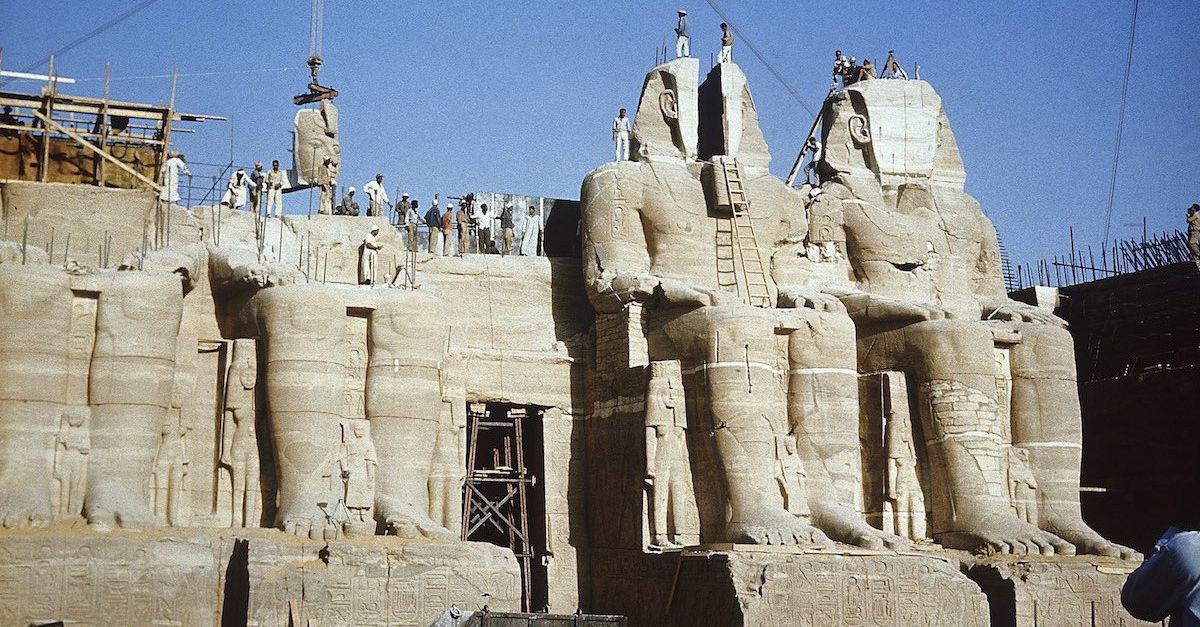
The Abu Simbel Temples Relocation Project is one of the most ambitious and complex architectural projects in the history of the world. The Egyptians and the entire world were tasked with a seemingly impossible mission that sought to save one of the oldest archaeological milestones in existence. The whole Abu Simbel relocation project paints a picture of the harmful effects of industrial innovations on one of the most glorious wonders of the ancient world, as if the new, advanced world is trying to sink the old world, but with the grace of god, passion of historians & archaeologists, and the innovation of modern science has led to finding a moment of balance between the old and the new, and the temples was cut and transported to a new location where it can shine with glory powerfully under the power of the sun.

Everything started in 1244 B.C when Ramses the great ordered to commemorate his legacy and honor the many gods of the sun and his wife Nefertiti by constructing what is known today as Abu Simbel Temple in the deep south of Egypt where it stayed for the next thousands of years until the temple need to be relocated before being destroyed by the sudden rise of Nile river water levels due to an idiotic human error is known as the Aswan High Dam.
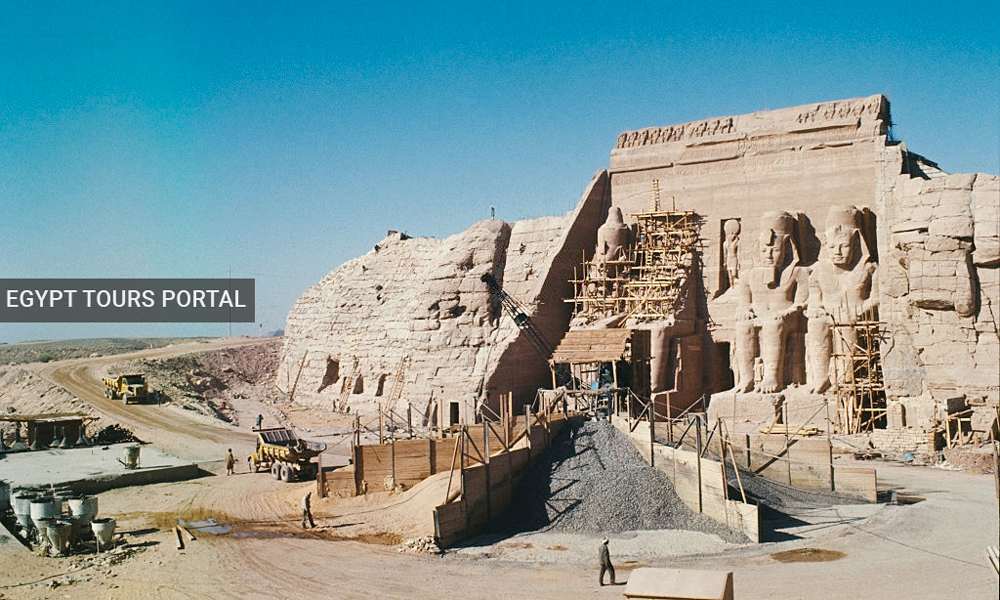
In the mid-1950s, the Egyptian government decided to build a dam in the city of Aswan in the hopes of controlling the Nile floods and generating Electricity, which led to the rise of the water level in Lake Nasser and submerging priceless monuments around it, such as the Abu Simbel Temple. In 1959, the Egyptian Government sends a request the Unesco for help in rescuing Abu Simbel, and in 1960, the world showed its true colors as an international fund-raising for the rescue operation began and a Swedish company by the name”Vattenbyggnadsbyrån” came up with a complex matter of how the temples could be saved.
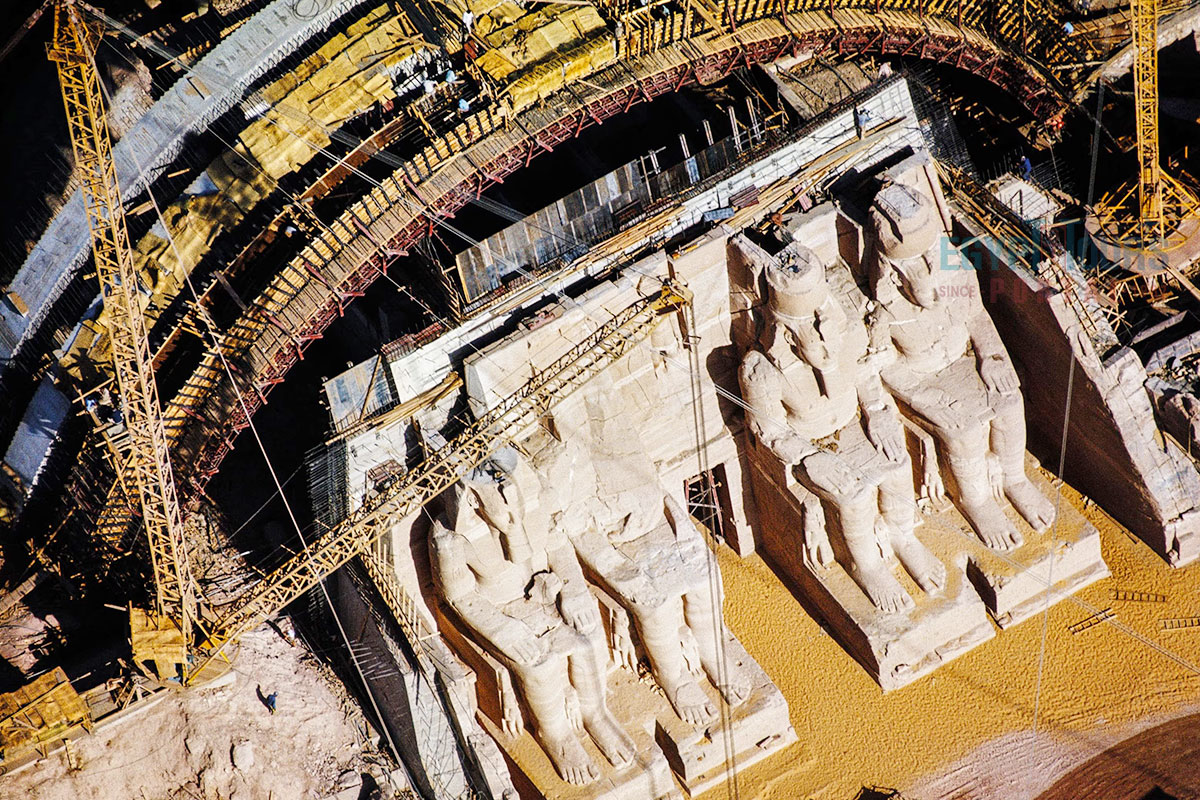
The temples of Abu Simbel were originally built during the reign of Pharaoh Ramses II around 1264 BCE to honor the ancient Egyptian deities Ra-Horakhty, Ptah, and Amun, as well as Ramses II himself. Even today, the two massive rock-cut temples stand as one of ancient Egypt’s greatest architectural achievements.
The larger of the two temples, dedicated to Ramses II, features four colossal statues of the pharaoh himself at the entrance, each towering about 20 meters (66 feet) high. The smaller temple, dedicated to Ramses' beloved wife, Queen Nefertari, features statues of both the queen and the pharaoh.
Before the relocation, the temples were set directly into the sandstone cliffs along the Nile, where their position was intentionally aligned so that twice each year, on February 22 and October 22, the rising sun would illuminate the inner sanctuary of the Great Temple, lighting up the statues of the gods. This precise solar alignment was not only a testament to the advanced astronomical knowledge of ancient Egyptian architects but also a symbol of the pharaoh's divine connection to the gods.
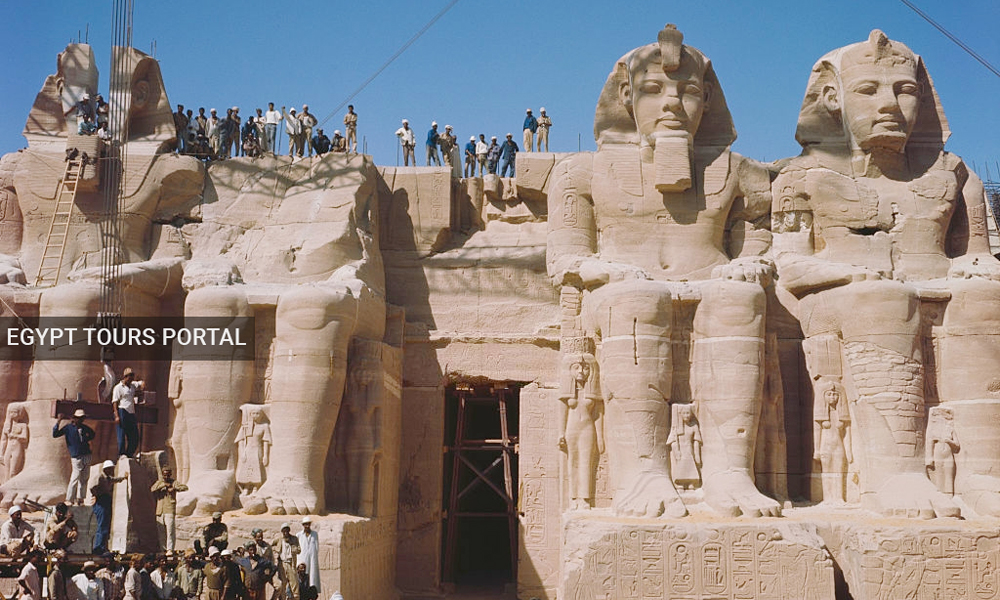
The temple was carved into a cliff so they were peeled away and then cut into blocks using power saws, each block weigh between 20 to 30 tons, then moved to a different location and assembled like a game of logos using drilled holes, reinforcement bars into an artificial cliff resembling the original on a platform of cement & steel and surrounded by an artificial stone mountain.
This operation took four years from 1964-1968 and cost 300 million dollars in today’s value. The new site was 65 m high and 200m further inland and was precisely reconstructed to illuminate the sun gods’ sanctums like Amon-Re and Re-Horakhty in February and October during certain hours in the spring and autumn using the sun rays. The entire complex was declared a UNESCO World Heritage site in 1979.
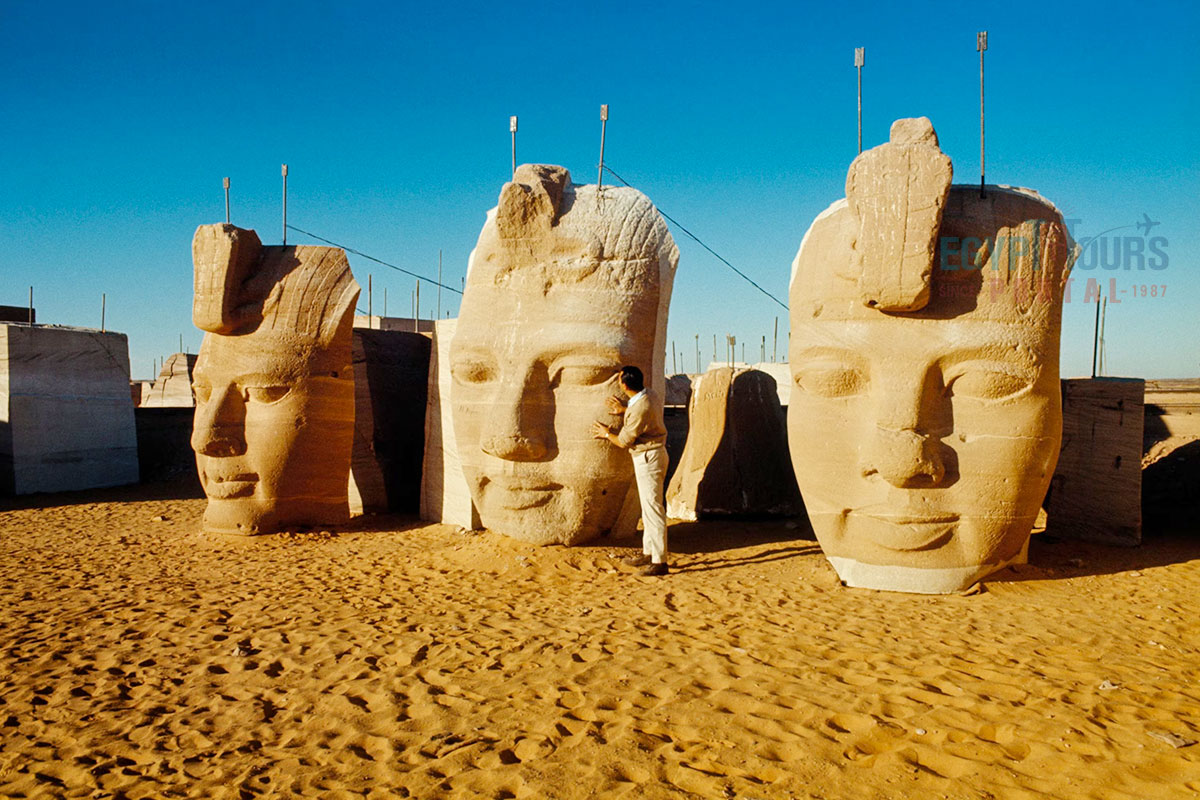
In the early 1960s, the construction of the Aswan High Dam on the Nile River threatened to submerge the temples of Abu Simbel under the rising waters of Lake Nasser. In response, an ambitious international campaign, led by UNESCO, was launched to save these monumental structures.
The cost of relocating Abu Simbel, a feat that would ultimately require cutting the temples into large blocks, transporting them, and reassembling them 65 meters (213 feet) higher and 200 meters (656 feet) further inland, was around USD 40 million (close to 400$ mi in today's value) which was a staggering sum at the time. This monumental effort involved a skilled team of engineers, architects, and laborers from all over the world, who worked tirelessly to ensure the temples' survival.
The two temples of Abu Simbel, one of the most famous landmarks in the world, can be explored through our breathtaking Egypt vacations or Nile river cruises to witness the ancient Egyptian attractions through the heart of Egypt.
Cairo Stopover Tour For UAE Travelers Cairo stopover tour is the ultimate porta...
Tour Location: Cairo/Giza...
Day Tour in Cairo and the Pyramids For UAE Travelers Day Tour in Cairo and The Pyram...
Tour Location: Cairo/Giza...
Day Trip to Pyramids from Cairo for UAE Travelers Day trip to the Pyramids from Cair...
Tour Location: Giza...
Day Trip from Luxor to Cairo by Plane For UAE Travelers Day trip from Luxor to Cairo...
Tour Location: Cairo...
The relocation of Abu Simbel was financed primarily through international contributions coordinated by UNESCO. Over 50 countries participated in the fundraising efforts, showing global dedication to preserving this ancient heritage site. Additional financial support came from the Egyptian government.
The relocation of Abu Simbel took four years, from 1964 to 1968. The project included cutting the temples into massive blocks, transporting them, and reconstructing them at their new site to preserve the original appearance and alignments as closely as possible.
The relocation was essential to protect the temples from being submerged by Lake Nasser, which was created as a result of the construction of the Aswan High Dam. Without relocation, Abu Simbel and other historic sites along the Nile would have been permanently underwater.
The temples were carefully cut into 1,042 blocks, each weighing between 20 and 30 tons, then reassembled piece by piece in their new location. This intricate process allowed the structures to be reconstituted with minimal deviation from their original forms and alignments.
One of the unique challenges in reassembly was to preserve the original solar alignment. Engineers succeeded in maintaining the twice-annual phenomenon, albeit with a minor adjustment; today, the sanctuary's illumination occurs on February 21 and October 21, a day later than originally.
The entire country of Egypt deserve to be explored with its every heavenly detail but there are places that must be seen before any other such as the breathtaking Hurghada's red sea, The wonders of Cairo the pyramids of Giza, the great sphinx, the Egyptian Museum, Khan El Khalili Bazaar, the wonders of Luxor like Valley of the Kings, Karnak & Hatshepsut temple and the wonders of Aswan such as Abu Simbel temples, Philea temple, Unfinished obelisk and The Wonders of Alexandria like Qaitbat Citadel, Pompey's Pillar and Alexandria Library. Read more about the best places to visit in Egypt.
If you want to apply for a Visa On Arrival that lasts for 30 days then you should be one of the eligible countries, have a valid passport with at least 6 months remaining and pay 25$ USD in cash, as for the E-Visa for 30 day you should have a valid passport for at least 8 months, complete the online application, pay the e-visa fee then print the e-visa to later be presented to the airport border guard. You could also be one of the lucky ones who can obtain a free visa for 90 days. Read more about Egypt travel visa.
Egypt has a variety of delicious cuisines but we recommend “Ful & Ta’meya (Fava Beans and Falafel)”, Mulukhiya, “Koshary”, a traditional Egyptian pasta dish, and Kebab & Kofta, the Egyptian traditional meat dish.
The best time to travel to Egypt is during the winter from September to April as the climate becomes a little tropical accompanied by a magical atmosphere of warm weather with a winter breeze. You will be notified in the week of your trip if the Climate is unsafe and if any changes have been made.
You should pack everything you could ever need in a small bag so you could move easily between your destinations.
We have been creating the finest vacations for more than 20 years around the most majestic destinations in Egypt. Our staff consists of the best operators, guides and drivers who dedicate all of their time & effort to make you have the perfect vacation. All of our tours are customized by Travel, Financial & Time consultants to fit your every possible need during your vacation. It doesn't go without saying that your safety and comfort are our main priority and all of our resources will be directed to provide the finest atmosphere until you return home.
You will feel safe in Egypt as the current atmosphere of the country is quite peaceful after the government took powerful measures like restructuring the entire tourist police to include all the important and tourist attractions in Egypt. Read more about is it safe to travel to Egypt.
Wear whatever feels right and comfortable. It is advised to wear something light and comfortable footwear like a closed-toe shoe to sustain the terrain of Egypt. Put on sun block during your time in Egypt in the summer to protect yourself from the sun.
The best activity is by far boarding a Nile Cruise between Luxor and Aswan or Vise Versa. Witness the beauty of Egypt from a hot balloon or a plane and try all the delicious Egyptian cuisines and drinks plus shopping in old Cairo. Explore the allure and wonders of the red sea in the magical city resorts of Egypt like Hurghada and many more by diving and snorkeling in the marine life or Hurghada. Behold the mesmerizing western desert by a safari trip under the heavenly Egyptian skies.
There are a lot of public holidays in Egypt too many to count either religious or nation, the most important festivals are the holy month of Ramadan which ends with Eid Al Fitr, Christmas and new years eve. Read more about festivals & publich holidays in Egypt.
Egypt is considered to be one of the most liberal Islamic countries but it has become a little bit conservative in the last couple of decades so it is advised to avoid showing your chest, shoulders or legs below the knees.
Arabic is the official language and Most Egyptians, who live in the cities, speak or understand English or at least some English words or phrases. Fewer Egyptians can speak French, Italian, Spanish, and German. Professional tour guides, who work in the tourism sector, are equipped to handle visitors who cannot speak Arabic and they will speak enough English and other languages to fulfill the needs of all our clients.
The fastest way is a car, of course, a taxi. If you are in Cairo ride a white taxi to move faster or you could board the fastest way of transportation in Egypt metro if the roads are in rush hour.
The temperature in Egypt ranges from 37c to 14 c. Summer in Egypt is somehow hot but sometimes it becomes cold at night and winter is cool and mild. The average of low temperatures vary from 9.5 °C in the wintertime to 23 °C in the summertime and the average high temperatures vary from 17 °C in the wintertime to 32 °C in the summertime. The temperature is moderate all along the coasts.
It is the home of everything a traveler might be looking for from amazing historical sites dating to more than 4000 years to enchanting city resorts & beaches. You will live the vacation you deserve as Egypt has everything you could possibly imagine.









